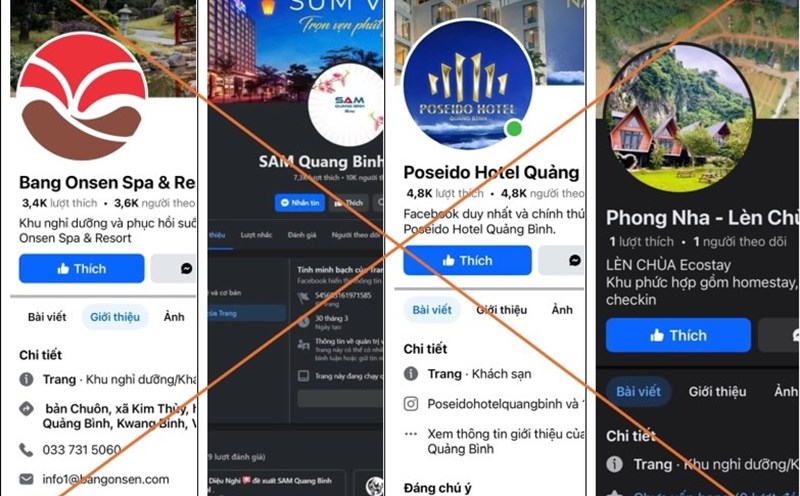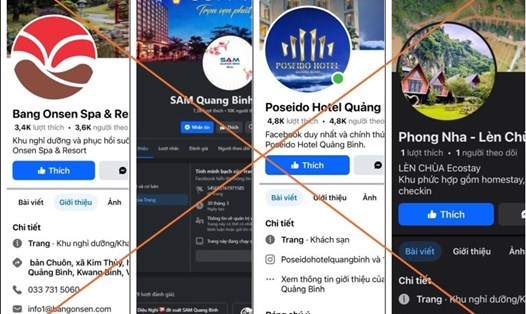Cheap travel combo scam
During the April 30 - May 1 holiday, the travel demand of Vietnamese tourists is increasing. On social networks, scams in the tourism industry have begun to flourish. In particular, the form of low-cost travel and resort combos continues to be used by many scammers to exploit the psychology of tourists who are eager to go out and enjoy cheap.
The subjects set up fake fanpages of famous hotels and resorts, posting eye-catching, professional images and content along with a series of attractive incentives, causing tourists to lose their vigilance.
After discussing hotel bookings and tours with tourists, the subjects often require a deposit of 30-50% of the total service value in advance. As soon as they received the money, the scam fanpages quickly "evaporated", leaving the victim unknown how to complain.
More sophisticatedly, after the first time scamming money, the subjects also coordinated to scamm more by pretending to be hotel/resort staff to call customers, notify them of "incorrect information transactions" and instruct customers to refund. However, if you click on the link as instructed, the customer's OTP will be stolen, causing a total loss of money in the account.
The situation of widespread fraud has made many people become victims, making tourists worried.
Ms. Thao Nguyen (35 years old, Nam Dinh) said: "Although I have researched very carefully about Laos tours and called the agent to confirm, I cannot rest assured about transferring the deposit.
In the end, I chose to go to a travel company to directly complete the registration procedures. Although time-consuming, this is the safest solution to avoid being scammed".

Because of this, many businesses, hotels, and homestays have more difficulty finalizing orders. Ms. Hai Linh - a ticket agent and hotel room shared: "Most of the customers who book tickets and rooms are regular customers. New customers tend to be afraid of transferring deposits because they are afraid that scams will be rampant on social networks. Therefore, although there is a high demand for travel during this holiday, we still have difficulty finalizing orders for customers".
Raising vigilance, preventing fraud
Online travel scams are increasing, especially during the April 30 - May 1 holiday, becoming a concern for the community and localities. Many travel companies, hotels, resorts, banks and authorities have warned about online travel scams.
On April 22, the Department of Cyber Security and High-Tech Crime Prevention (Hue City Police) and the Hue City Smart City Monitoring and Operation Center (HueIOC) issued a warning about forms of fraud during the April 30 - May 1 holiday.
According to the Department of Cyber Security and High-Tech Crime Prevention, taking advantage of the increased travel demand of people, especially during the April 30 - May holiday and the upcoming summer vacation, many bad guys have increased fraudulent activities to appropriate people's property in many forms.
Some signs to identify these forms of fraud include: Subjects often advertise unusually cheap tourism services, using the slogan "only today's promotion", "urgent reservation", ...; Using Fanpages with names that easily cause brand confusion, have blue tick marks but do not clearly verify; office information is vague, only send private messages via Messenger/Zalo, no specific company address; No clear contracts or terms, only require "quick money transfer to keep a seat".
According to the police, to avoid being taken advantage of by bad guys and having their property stolen, people need to be vigilant. Do not transfer deposits if the origin of the fanpage/website is not clearly verified.
Prioritize booking tickets/tour/room through reputable applications or companies with clear addresses.
Carefully check legal information, evaluate users and contact via official hotline. If you suspect being scammed, you should immediately report to the nearest police agency for timely support.
Previously, in mid-February 2025, the Vietnam National Administration of Tourism sent a document to the Department of Culture, Sports and Tourism, and the Departments of Tourism of provinces and centrally run cities, requesting to strengthen the prevention, control and handling of fraudulent acts of appropriating assets in cyberspace in the tourism sector.






